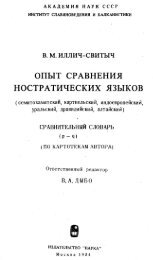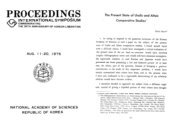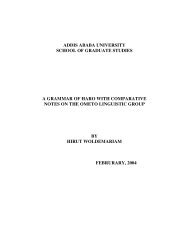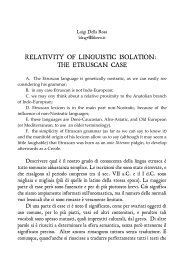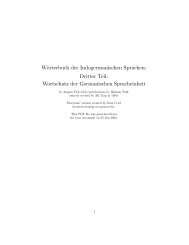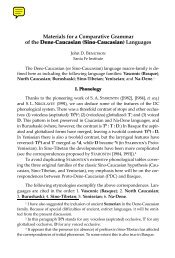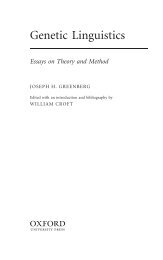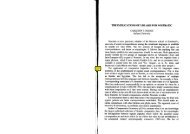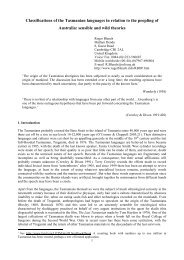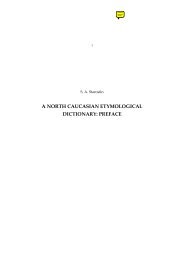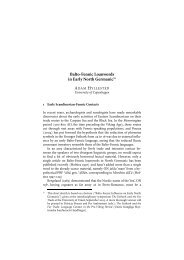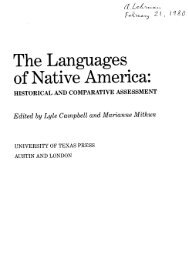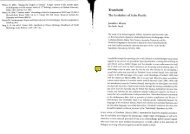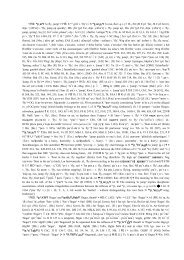The Indo-European Elements in Hurrian
The Indo-European Elements in Hurrian
The Indo-European Elements in Hurrian
Create successful ePaper yourself
Turn your PDF publications into a flip-book with our unique Google optimized e-Paper software.
120 8. Comparison of <strong>Hurrian</strong> and <strong>Indo</strong>-<strong>European</strong> Vocabularies<br />
-ma (< *mē/*mō) negative<br />
suffix<br />
madi (< *mod-) ‘wisdom,<br />
<strong>in</strong>telligence’;<br />
ma-a-t- (< *mod-) ‘to show<br />
wisdom, to be wise’<br />
(Catsanicos 1996)<br />
ma-al-la-ti (< *mol-) ‘chopp<strong>in</strong>g<br />
board’ (Catsanicos 1996)<br />
*mē (prohibitive/negative<br />
particle) ‘do not; no, not’<br />
(Pokorny 1959:703; Walde<br />
1927—1932.II:236—237;<br />
Mann 1984—1987:738)<br />
*med-/*mod- ‘to measure, to<br />
measure out; to estimate, to<br />
reckon’ (Pokorny 1959:705—<br />
706; Walde 1927—1932.II:<br />
259; Mann 1984—1987:739,<br />
739—740, 740, 782—783;<br />
Puhvel 1984— .6:167—168)<br />
*mel-/*mol-/*mC- ‘to rub, to<br />
crush, to gr<strong>in</strong>d’ (Pokorny<br />
1959:716—719; Walde<br />
1927—1932.II:284—291;<br />
Mann 1984—1987:728, 749,<br />
750, 751—752, 752, 753, 773,<br />
773—774, 774, 775—776,<br />
776, 776—777, 777, 777—<br />
778, 791—792, 792—793,<br />
793, 815, 816; Kloekhorst<br />
2008:547—548)<br />
stressed particle me; Greek<br />
(<strong>The</strong>ssalian) μά = δέ ‘but’<br />
Sanskrit mZ ‘do not; not, that<br />
not, lest, would that not’;<br />
Greek μή ‘do not; no, not’;<br />
Armenian mi ‘do not’;<br />
Tocharian A (prohibitive and<br />
negative particle) mā ‘not, no’,<br />
(prohibitive particle) mar ‘do<br />
not’, also used as a negative<br />
prefix as the equivalent of<br />
English ‘un-’<br />
Greek ìÝäïìáé ‘to provide for,<br />
to be m<strong>in</strong>dful of’; Lat<strong>in</strong><br />
meditor ‘to th<strong>in</strong>k over, to<br />
consider’, modus ‘measure,<br />
standard of measure’; Hittite<br />
(gen. sg.) mi-te-eš-na-aš<br />
‘measure, weight’, (abl. sg.)<br />
mi-id-na-az ‘measure, counsel,<br />
ord<strong>in</strong>ance, resolve, device’;<br />
Gothic mitan ‘to measure’;<br />
Old Icelandic meta ‘to reckon,<br />
to estimate’; Old English<br />
metan ‘to measure, to mark<br />
off, to mete out, to compare’;<br />
Old High German mezzan ‘to<br />
measure, to compare, to<br />
compute’, mez ‘measure’<br />
Hittite ma-al-la-i ‘to crush, to<br />
gr<strong>in</strong>d’, me-ma-al ‘meal’;<br />
Sanskrit m0zZti, m0záti ‘to<br />
crush, to gr<strong>in</strong>d’, m0dú- ‘soft,<br />
delicate, tender, pliant, mild,<br />
gentle, weak, feeble’, mlZyati<br />
‘to wither, to fade’; Greek<br />
Pìáëä%íù ‘to soften’, Pìáëüò<br />
‘soft, weak, feeble’, ìáëáêüò<br />
‘soft’, ìáëÜóóù ‘to make<br />
soft’, ìýëç ‘mill, handmill’,<br />
ìýëïò ‘millstone’; Lat<strong>in</strong> molō<br />
‘to gr<strong>in</strong>d’, mollis ‘soft, tender,<br />
pliant, supple, flexible,<br />
yield<strong>in</strong>g’, mola ‘millstone’,



